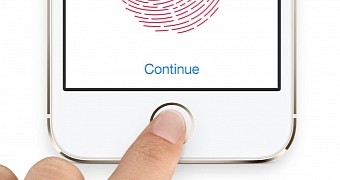The FBI said earlier this week that it can’t access the data stored on the phone allegedly belonging to Texas shooter David Kelley, but even though device manufacturers were at first the ones to blame for the strong encryption they provide, it looks like the agency itself is responsible for not being able to extract the data.
First and foremost, even though the FBI itself refused to disclose the brand and model of the phone the shooter was using, it looks like it’s an iPhone, and just like it happened in the San Bernardino attack, the agency has a hard time getting around the encryption.
But according to a report by Reuters, the FBI might have missed the chance to easily unlock the phone by simply not knowing how Apple’s Touch ID system works.
First of all, some context. The iPhone was found by local police authorities, who according to the report, tried to unlock the device on their own. While it’s not clear how exactly they attempted to do that, the device was then sent to FBI’s crime lab in Quantico, Virginia where the agency’s experts started looking into ways to extract the data.
Touch ID disabled after 48 hours
Only that it appears the FBI hasn’t actually thought of using the dead shooter’s finger to unlock the device protected with Touch ID fingerprint protection and, at the same time, the agency did not contact Apple to ask for assistance. Since the FBI turned to other methods, Touch ID was disabled after 48 hours as per Apple’s security policy on the iPhone, with the device now asking for the passcode instead.
The Reuters report states there’s no confirmation just yet that Touch ID was enabled on the iPhone or if the device was restarted or turned off, both of which would have triggered the passcode protection.
While it’s not yet clear if using a dead man’s finger to unlock the device is 100 percent effective, it’s pretty much the first thing to do when dealing with such a case, especially when working against the clock.
Apple says the company’s experts themselves contacted the FBI to help with the investigation, but as usual, they won’t hack the passcode and only provide alternative ways to extract data (if any), like access to iCloud backups.
“ We were shocked and saddened by the violence in Texas last Sunday, and we join the world in grieving for the families and community that lost so many loved ones. ”
“ Our team immediately reached out to the FBI after learning from their press conference on Tuesday that investigators were trying to access a mobile phone. We offered assistance and said we would expedite our response to any legal process they send us. ”
“ We work with law enforcement every day. We offer training to thousands of agents so they can understand our devices and how they can quickly request information from Apple. ”
It remains to be seen if the FBI eventually manages to break into this iPhone, but judging from what happened in the San Bernardino saga, the agency might once again have to turn to third-party hackers to do look into the data stored on the device.
 14 DAY TRIAL //
14 DAY TRIAL //